 |
 |
 |
 |
 |
 |
 |
| ROUNDTABLE: ELECTORAL PLATFORMS AGAINST SEXUAL DISCRIMINATION |
| |
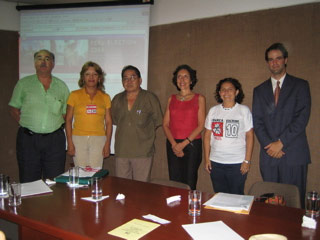 |
Photo: J. Bazo
Oscar Ugarteche, Belissa Andía, Vicente Otta, Sandra Vallenas, Susel Paredes y Víctor Andrés García Belaúnde Velarde |
| |
|
|
|
|
Universidad del Pacifico and Weblog Peru Election 2006 Roundtable
“Peru Election 2006: Analysis of Policy Platforms to Support Sexual Diversity”
Maxwell Cameron & Fabiola Bazo
March 20, 2006 |
Under the auspices of Universidad del Pacifico, a roundtable on “Policy Platforms to Support Sexual Diversity” was held on Friday, March 10, 2006. What follows is a brief summary some of the key issues and conclusions that emerged from the discussion.
On Friday, March 10, 2006, a public round table discussion was held at the Universidad del Pacífico on “Analysis and Programmatic Proposals on Sexual Diversity” in the 2006 election. The participants included:
Belissa Andia, Movimiento Nueva Izquierda
Vicente Otta, Partido Unión por el Perú
Susel Paredes, Partido Socialista
Víctor Andrés García Belaúnde Velarde, Frente de Centro
Sandra Vallenas, Universidad Católica del Peru
Oscar Ugarteche, Comentarista
Moderator: Fabiola Bazo, “Peru Election 2006” Weblog
|
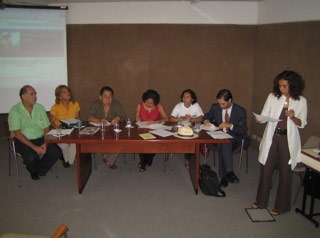 |
| |
Fabiola Bazo began by asking the panelists to outline their proposals with respect to sexual diversity and non-discrimination, and to offer their assessments of the progress or reversals that have occurred in Peru in recent years with respect to the rights of gays, lesbians, transsexual and bisexual persons (GLTB). What can we expect from this election, and what issues are being raised in the campaign? How do these issues play with the voters, and what is at stake in this election in terms of rights and discrimination?
Belissa Andia spoke first, arguing for a program of eradication of discrimination and marginalization. She is running on the New Left Movement (MNI) ticket as a transsexual person to express the right to sexual diversity. She strongly repudiated violence against transvestites, and called attention to the serious abuses being committed by the Serenazgos of Lima under the control of mayor Luis Castañeda Lossio, leader of Solidaridad Nacional, member of the alliance Unidad Nacional.
|
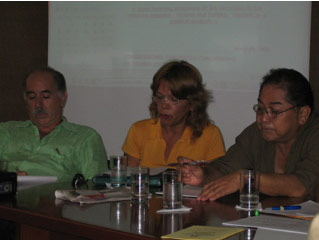 |
Andia outlined a set of policy changes that are part of the programmatic proposals of the MNI, and which include the recognition of any stable union between two people; the elimination of hate crimes; equal rights to work, education and healthcare, regardless of sexual orientation; no discrimination in laws regulating conjugal unions; equal tax benefits for all couples; non-discrimination in sexual education; campaigns against homophobia; efforts by the Ministry of Women to promote freedom from violence for women, and centers of attention for battered women; full respect for human rights and no impunity for crimes against humanity.
The next speaker was Vicente Otta, member of the government plan team for the Union for Peru, or UPP. Otta argued that the problems of inequality and exclusion are rooted in the nature of the Peruvian state. Since its foundation in the origin of the republican era, the Peruvian state has excluded the majority of the population, especially indigenous peoples, and this exclusionary state has reigned for most of the 20th century. Otta proposed a constitutional change that would create a nationalist and democratic social pact, creating a state capable of inclusion. Otta mentioned Jose Matos Mar’s famous work Desborde popular y crisis del Estado, and argued that 20 years after its publication the crisis of the state has only intensified. There is more informality, less social security, and a dysfunctional relationship between state and society. Without rights, citizens confront a state from a position of inequality. This is true for broader social rights, as it is for particular, sectoral, and sexual rights. Otta paid homage to Oscar Ugarteche as a founder of the Homosexual Movement of Lima (MHOL), and called for stronger penalties for agents of the state who violate rights.
|
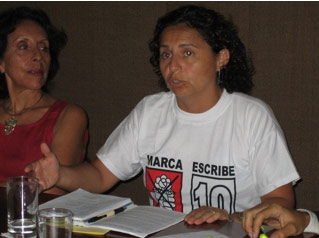 |
Susel Paredes followed. She began by affirming that she has been a socialist militant since she was 17 years old, first in the PUM (Unified Mariateguista Party) and now in the Socialist Party with Javier Diez Canseco. The Socialist Party chooses its candidates by internal democracy, overseen by the National Office of Electoral Processes (ONPE) and there are no “consensus lists.” She was proposed by lesbian and feminist groups, and placed 5th on the list of candidates to congress. She made public her sexual orientation as a lesbian as an act of honesty and to advance her policy agenda. There are 24 public policies for the inclusion of GLBT population that the Socialist Party wishes to advance in the next legislature.
Paredes says she sees her role as a legislator and agent of accountability. Working with Flora Tristan, she has contributed to citizen accountability on issues like AIDS and HIV as well as the rights of women and lesbians. She noted that Cardenal Cipriani has asked that the candidates not talk about social issues like abortion or gay marriage in this campaign, and she is happy to defy the Cardenal. In congress, she will fight for the legalize abortion especially for women who cannot afford expensive clinics; equality in civil law for all couples; and a change in the definition of marriage in the civil code.
The next speaker was Víctor Andrés García Belaúnde, of the Frente de Centro (Centrist Front). He acknowledged that his group has a more traditional view on these issues than he does personally, and that while it affirms equal rights it is silent on sexual rights. Speaking as a psychologist, he outlined the many dimensions of sexuality—genetic, genital, identity and orientation—and said that those opposed to diversity are often ignorant of the issues and know little of the homosexual community. He called for sexual education based on the latest scientific knowledge, and a rejection of ideas about what is “normal” that are, in fact, social constructs. Homosexuality is no longer considered an illness, and represents as much as 10 percent of the population. García Belaúnde closed by calling for “equality for all” (the campaign slogan of his group) including the rights of homosexuals.
|
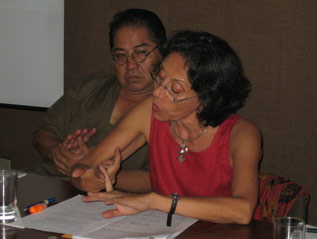 |
The next presenter was sociologist Sandra Vallenas, who offered not policy proposals but analysis of polling results on the topic of tolerance toward homosexuals and lesbians. According to a poll conducted by the Catholic University, 31 percent of the electorate would vote for a homosexual or lesbian candidate (7 percent said “definitely” and 24 percent said “probably”). The most tolerant groups are in higher income brackets (“A & B” voters). In those sectors, 17 percent would definitely vote for such candidates, and 30 percent probably would. This tolerance was highest among youth. At the same time, Vallenas noted there are high levels of intolerance in all groups, including youth. 61 percent of youth said they would “never” vote for a homosexual or lesbian candidates, and the figure in the “A & B” category overall was 42 percent.
Finally, the round table was wrapped-up by Oscar Ugarteche who said that he was pleased to be at a discussion of these issues in the Universidad Pacifico, , and that he was delighted to see a new generation of leaders taking up the cause of the rights to sexual diversity. We are an adolescent country, he said, of people who care too much what others think and not enough about being ourselves. Tolerance is not our great strength, he said. He characterized Peruvian society as closed and exclusionary, based on circles of trust that reinforce social divisions.
|
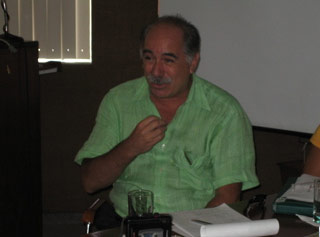 |
Ugarteche traced the evolution of global advances in the struggle against discrimination starting with Strasbourg Treaty in 1992, and he emphasized the role of Norway as a leader in Europe. Spain is a recent convert, and Germany is still wavering. The Dane have adopted the Norwegian initiative, as have the Canadians outside of Europe. Federal countries like Argentina, Mexico and the US have had problems advancing the agenda at the subnational level because national governments have often overturned policies adopted by provinces and states (Buenos Aires being an exception). Even progressive parties have had difficulties.
In Peru, the GLBT community is the most excluded, and within that group, rural women have the fewest options. The 17 percent within the “A & B” perhaps have rights, though even there tragedies have occurred. GLBT people contribute to society, pay taxes, and deserve the same laws. In his view, the GLBT community stands roughly where women were in 1923: perhaps on the Cusp of irreversible changes for the political class. But mobilized in opposition are the forces of the Vatican, and the US government. An example of an effort to prevent change was the intention to propose an “anti-sodomy” law, under Fujimori, that could be revived in the future if is elected that is hostile to GLBT rights.
Following the presentations, questions were taken from the audience. One person asked whether the issue of sexual diversity was really on the agenda in this election. Noting the lack of serious proposals and frontal debate on the matter, it would seem that the topic is marginal. Even within the parties that are more out front on the issue, how strongly do these candidates have the backing of their respective parties?
Andia responded saying that the process is a slow one, but her party is ideologically committed to the issue. Paredes agreed with respect to her party, and noted that Concertacion Decentralista also has proposals on the issue. Otta acknowledged that his party does not have concrete proposals with respect to sexual diversity, and recognized this as a limitation and error. He attributed this to the haste with which the UPP plan for government was prepared, a view that was dismissed as disingenuous by a member of the audience from Red Fatherland (Patria Roja) who claimed the nationalists had lifted all sort of ideas from his party’s platform except the points on non-discrimination. For his part, Otta questioned whether it was possible for old-line Stalinist parties to sincerely come around on these issues.
Otta was then challenged by the audience with a question that suggested that his discourse was similar to the position of the left of the 1970s on women’s rights: first solve economic problems, then issues of personal liberty will follow. Add to this the misogyny and homophobia within the military, and the UPP’s position becomes even more problematic.
Otta responded by saying that the UPP will probably form the next government. He acknowledged that there are elements of old guard thinking in the UPP, but insisted that there has to be a clear macropolitical line to orient policy. A truly nationalist government is necessary to guarantee the equal rights of all citizens. That said, it would be desirable to have policies and leaders from this sector within the UPP.
Regarding misogyny and homophobia, Otta made three points:
(1) 2006 is not the same as 1970. Gay rights have made advances and conquered spaces that cannot be lost.
(2) Political processes are contradictory. Velasco was not particularly homophobic, and it was the government that was most closely aligned with Peruvian society of the 20th century.
(3) The nationalist movement is not a military project. It is led by a person with a military background. He is military, but not homophobic. His personal commitment to this issue is “why I am here,” said Otta.
Paredes expressed profound concern about homophobia in the military, pointing to opposition to the inclusion of sexual rights within human rights commitments in the National Plan for Human Rights from the Church and the military. The “classic alliance of robes and boots” is a major obstacle to the advance of the rights of the GLBT community and the election of a military president fills her with terror.
Then, addressing a question about homophobia and misogyny on the left, Paredes said she is not been utilized and could not be thrown out of her party; because she is not an invited militant, and not placed on the list to get visibility with this sector; she is on the list because she was proposed by feminist and lesbian members of her party and selected by the party rank and file. Her goal is to democratize the left and lead her party. Andia said the same: her candidacy is not the result of an electoral calculation by her party leadership but the result of an unexpected opening.
Ugarteche talked about how he was brought into the campaign in two moments. At one point he was approached to be a vice presidential candidate for the Socialist Party. On another occasion, he was mentioned in the press by Victor Andres (“Vitocho”) Garcia Belaúnde (father of Víctor Andrés García Belaúnde. and an important leader of the Frente de Centro). Lourdes Flores Nano had been asked if she would include a gay or lesbian in her cabinet and she responded that she would have no objection but could think of no one off hand. Vitocho Garcia Belaúnde immediately announced that he could easily see Ugarteche as a finance minister in a future government of Valentín Paniagua. In both cases, these reference fell from the sky, as Ugarteche has been living in Mexico City where he has a tenured position at UNAM (something that was never offered to him by the Catholic University in Peru during the 25 years that he worked there).
Notwithstanding his decision to leave Peru, Ugarteche feels there has been an opening in recent years as a result of the formation of GLBT groups and the emergence of spaces within parties for this community. He would be pleased to see a couple of GLBT members of congress, but notes that Peru has come to occupy a pole of conservative thinking in South America, as an ally of both Washington and the Vatican, that was formerly held by Argentina.
Ugarteche also spoke about class and sexual diversity in response to a question about GBLT people who are poor. He said that when gays are rounded up in places where they gather, it does not matter whether you are rich or poor—either way, you’re gay. But if you are poor, it is worse still, since you have fewer means of defense. He spoke of lamentable persecution of the gay community by former mayor Alberto Andrade, which included shaming people by publishing the license plate numbers of vehicles that engage with transvestites and prostitutes in a newspaper of major circulation.
One of the questions from the floor criticized García Belaúnde for not having a clearer position. Specifically, he treated the issue of sexuality as a matter of private rights rather than a public issue about power; and spoke in terms of improving understanding rather than establishing rights. García Belaúnde responded saying he favors gay marriage, equality and non-discrimination. There is a range of positions within the Centrist Front, with some people favoring non-discrimination but drawing the line at gay marriage. He said his personal mission is to push for a more open position within his party and the Centrist Front, something he shares with his father.
Members of National Unity (Unidad Nacional), , Decentralist Concertation (Concertación Decentralista) and the Independent Moralizing Front (Frente Independiente Moralizador) were invited but did not attend.
|
| |
|
|
|
 |
|




